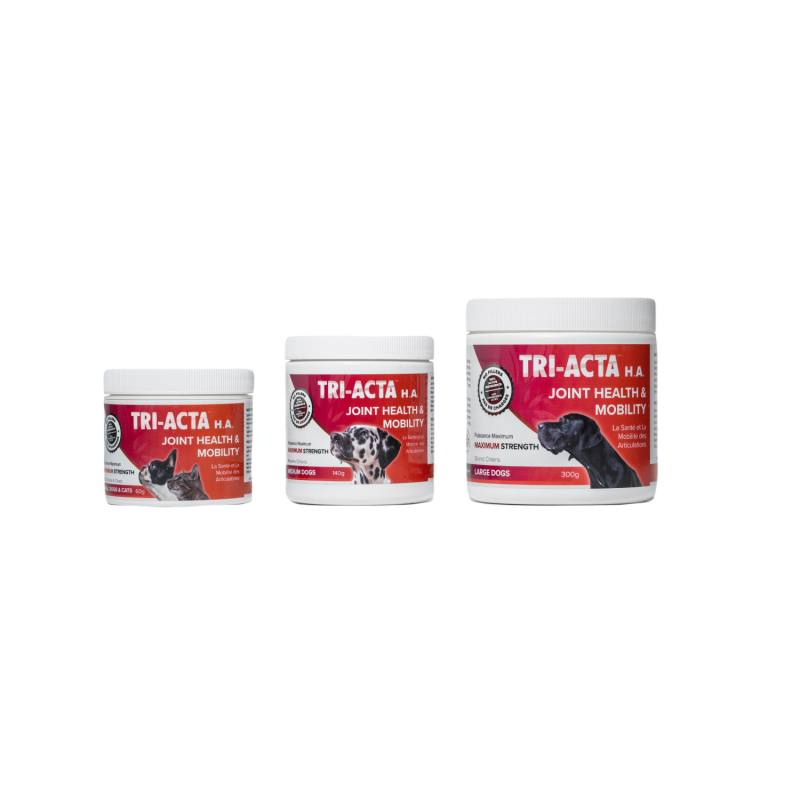Table of Contents
Salmon oil isn’t just a supplement—it’s like a superfood smoothie for your dog! Packed with omega-3, omega-6, and omega-9 fatty acids, this liquid gold apparently does it all, from giving your pup a glossy, pet-me-now coat to supporting their heart, brain, and joints.
Since dogs can’t make most of these essential fatty acids on their own, adding salmon oil to their diet is an easy way to keep them healthy, happy, and full of wagging tails. But although salmon oil has a ton of benefits, it’s important to recognize that it likely won’t make a massive difference if your dog has a joint condition like arthritis. In that case, incorporating a dog joint supplement either instead of or in addition to salmon oil is recommended.
Ready to dive into the wonders of salmon oil? Let’s break down why it’s a must-have for your furry friend and how to use it like a pro!
Why is Salmon Oil Good for Dogs?
Salmon oil for dogs is a supplement that is rich in omega 3, 6, and 9 fatty acids. This trio of healthy fats provides a myriad of benefits from head to toe for your dog. At a high level, giving your dog these fatty acids promotes a healthier coat, skin, improved heart health, boosted immune system, a healthy brain, and improved joint health. In general, the trifecta of fatty acids (Omega 3-6-9) have been found to be an important component in healthy cell membrane development for all mammals.
As a side note, the number next to the Omega when describing a fatty acid doesn’t refer to the number of acids, but rather the chemical structure of the acid itself.
Dogs, like humans, can’t produce most of these important acids naturally (they can produce Omega 9 fatty acids, but may not produce enough on their own), so they must get them from food sources. There are a ton of different foods that contain omega 3-6-9 fatty acids, like eggs, nuts, seeds, and, of course, fish. But salmon oil stands out because it’s a source of all three of these acids, and given that it’s an oil and can be easily mixed into food, it’s easy to give your dog.
Salmon Oil for Dogs Benefits
To understand why this particular supplement has become so popular among dog owners, we’ve got to dig deeper into what these fatty acids are and why they matter so much.
Let’s break down the different fatty acids that salmon oil contains, starting with Omega 3 fatty acids:
|
Omega 3 Fatty Acids Found in Salmon Oil for Dogs |
Why They Are Beneficial for Dogs |
|
DHA (Docosahexaenoic Acid), EPA (Eicosapentaenoic Acid) |
|
|
ALA (alpha-linolenic acid) *Plant-based, so not naturally found in salmon. However, many supplements will add it in. |
|
Next, let’s explore the Omega 6 fatty acid found in salmon oil for dogs:
|
Omega 6 Fatty Acid Found in Salmon Oil for Dogs |
Why It is Beneficial for Dogs |
|
Linoleic Acid (LA) |
Plays a significant role in maintaining skin health, including maintaining the skin’s outermost water barrier. Many other essential molecules in your dog’s body are made from linoleic acid. |
Last and maybe least, Omega 9s:
|
Omega 9 Fatty Acid Found in Salmon Oil for Dogs |
Why It is Beneficial for Dogs |
|
Oleic Acid (OA) |
While not considered “essential” because it is naturally made in the body, many supplements contain this omega 9 fatty acid because it does play an important role in supporting heart health, promotes energy and mood, and memory and cognition. |
At the very least, all fish oil supplements for dogs, including wild Alaskan salmon oil for dogs, will contain at least the two most important Omega 3s. However, choosing a supplement that contains the 3-6-9 trifecta is more beneficial for your dog’s overall health.
How Do I Feed My Dog Salmon Oil?
When it comes to feeding your pup salmon oil, you thankfully have several different options available to you:
- Liquid Form: Measure the recommended dosage (based on your dog's weight) and mix it into their regular food. Thankfully, many dogs enjoy the taste of salmon oil, but yours may not. If they don’t, you may be able to mask the flavour in wet food.
- Capsule Form: If the salmon oil is in capsules, you can either give the capsule directly or open it and mix the contents into their food. Capsules usually store better than straight liquid and are much easier to dose.
- Treats or Supplements: Some brands offer salmon oil in treat form for easier administration. Usually salmon oil chews for dogs or other treats are flavoured with chicken, beef, or something similarly tasty.
How Often Should I Give My Dog Salmon Oil?
Generally, salmon oil is given once daily with a meal. The dosage depends on your dog's size, weight, and individual health needs. If your dog has a certain medical condition, such as arthritis, the dosing may be different compared to if you’re just giving salmon oil to your dog for general health reasons.
For example, one veterinary teaching hospital recommends giving an animal (dog or cat, typically) 310 mg of EPA/DHA per kg once a day for arthritis. Another article recommends much less. As you can see, dosing can be tricky, which is why it is vitally important to follow the guidelines on the product packaging and/or to consult your veterinarian.
As an aside, it’s important to note that salmon oil for dogs on its own probably won’t completely address your dog’s joint issues, unless they are very minor. If your dog has arthritis or joint degradation or is susceptible to it (which most dogs are), then incorporating a joint supplement into their diet is more beneficial than relying on salmon oil alone.
TRI-ACTA contains two types of glucosamine (sulfate to support cartilage and overall joint health, and Hydrochloride, which is absorbed by your dog’s body faster), Methylsulfonylmethane (MSM, a natural anti-inflammatory), and chondroitin sulfate (helps with cartilage regeneration and repair). TRI-ACTA H.A, our extra-strength version, contains hyaluronic acid, which helps with lubricating the joints to allow for easier movement. These natural ingredients work together to repair and regenerate your dog’s joints over time, offering a more stable and reliable solution for long-term joint health.
TRI-ACTA H.A. for Pets
Our maximum strength formula is optimally designed to accelerate the formation of cartilage, minimize inflammation, expedite the healing process, and improve joint conditions.

Can I Give My Dog Too Much Salmon Oil?
Too much salmon oil, for the most part, will have mild side effects, including:
- Diarrhea or loose stools
- Vomiting
- Weight gain (due to the high-calorie content of the product)
It’s when too much is given over time that a more serious problem can occur. If you give your dog too much salmon oil over a long period of time, they can develop altered platelet function leading to blood clotting problems, which can cause slow wound healing, altered immune function, and more. Stick to the recommended dosage amount on the product’s packaging, and better yet, consult your veterinarian if you’re unsure or notice that your dog has developed symptoms.
Are There Any Side Effects of Salmon Oil for My Dog?
Most dogs tolerate salmon oil well, but some potential side effects (over and above the ones listed above that can result from overdosing) include:
- Gastrointestinal Upset: Diarrhea, vomiting, or bad breath.
- Allergic Reactions: Rare, but if your dog has a fish allergy, avoid salmon oil.
- Increased Bleeding Risk: Excessive amounts can thin the blood.
- Oxidative Stress: Poor-quality oils may contain harmful substances. Always choose a reputable brand with purity guarantees.
How Is Salmon Oil Different From Other Oils for Dogs?
Salmon oil is one type of fish oil and is distinct from other oils due to its specific nutrient profile, benefits, and sources. In general, salmon oil for dogs is the go-to choice for addressing inflammation, improving skin/coat health, and supporting joint, heart, and brain health.
While fish oil is similar, it’s often less specific and may vary in fatty acid content depending on the blend. Typically, fish oil for dogs focuses on omega 3s and less on omega 6 and 9 fatty acids.
There is also coconut oil, which acts as an alternative to salmon oil for dogs. While it is great for energy, digestion, and skin hydration, it lacks the anti-inflammatory benefits of omega-3-rich fish or salmon oil.
Here is a direct comparison of the different types:
Salmon Oil vs. Fish Oil for Dogs
|
Salmon Oil |
Fish Oil |
|
|
Source |
Extracted specifically from salmon. |
Typically a blend of oils from various fish like anchovies, mackerel, and sardines. |
|
Omega 3 Content |
High in EPA (eicosapentaenoic acid) and DHA (docosahexaenoic acid). |
Also rich in EPA and DHA, but the exact content varies depending on the fish sources. |
|
Nutrient Profile |
Contains astaxanthin, a powerful antioxidant naturally present in salmon. |
May lack astaxanthin unless specifically added. |
|
Taste and Palatability |
Dogs often prefer the stronger flavor of salmon oil. |
Milder flavor; some dogs may find it less appealing on its own. |
|
Use Case |
Ideal for skin, coat health, and inflammation due to its high omega-3 and antioxidant levels. |
Similar benefits but may not be as concentrated as pure salmon oil. |
|
Cost |
Often more expensive due to being species-specific. |
More affordable and widely available. |
Salmon Oil vs. Coconut Oil for Dogs
|
Salmon Oil |
Coconut Oil |
|
|
Source |
Extracted specifically from salmon. |
Extracted from coconuts. |
|
Omega 3 Content |
High in EPA (eicosapentaenoic acid) and DHA (docosahexaenoic acid). |
Also rich in EPA and DHA, but the exact content varies depending on the fish sources. |
|
Nutrient Profile |
Contains astaxanthin, a powerful antioxidant naturally present in salmon. |
May lack astaxanthin unless specifically added. |
|
Primary Benefits |
|
|
|
Taste and Palatability |
Dogs often prefer the stronger flavor of salmon oil. |
Milder flavor; some dogs may find it less appealing on its own. |
|
Use Case |
Ideal for skin, coat health, and inflammation due to its high omega-3 and antioxidant levels. |
Similar benefits but may not be as concentrated as pure salmon oil. |
|
Cost |
Often more expensive due to being species-specific. |
More affordable and widely available. |
Salmon Oil and Dog Allergies
Salmon oil obviously provides many benefits for dogs, but what about dogs that are sensitive to supplements or have a fish allergy? Although the latter is uncommon (one study of 297 dogs found that only 5 dogs, or 2%, had a fish allergy, although they also lumped that allergy in with rice) it is still a concern, especially for dog owners who have noticed the allergy in their pup. Usually, the allergy will present as pruritus, which is a medical term that simply means itching. Of course, if your pup is constantly scratching, that’s uncomfortable and painful for them and distressing for you. If your dog has a fish allergy, it’s easy enough to find plant-based substitutes to salmon oil for dogs, however, they may not get the same concentration of Omega fatty acids per dose compared to salmon oil.
In other cases, your pup might be more sensitive to the preservatives, additives, and fillers that are often found in dog food, treats, and supplements like salmon oil. In this case, it’s important to observe these considerations:
- Purity: Opt for products that are free from additives, preservatives, and fillers to reduce the risk of adverse reactions.
- Source: Wild-caught salmon is generally preferred over farmed salmon due to its higher nutrient profile and lower likelihood of contaminants.
- Processing: Cold-pressed oils retain more nutrients and are less likely to contain harmful oxidation products.
- Certification: Look for products that have been tested for purity and potency by third-party organizations.
Before introducing any new supplement into your dog's diet, especially for managing allergies, it's essential to consult with your veterinarian. They can provide personalized recommendations based on your dog's specific health needs and ensure that the supplement won't interact with any medications or conditions.
Types of Salmon Oil for Dogs
Salmon oil supplements for dogs come in different forms and processing methods, each with its benefits. Choosing the right type depends on your dog's preferences, health needs, and the quality of the product.
1. Based on Form
Liquid Salmon Oil
- Description: Bottled oil, easy to pour and mix into food.
- Pros:
- Convenient for precise dosing.
- Ideal for dogs who eat wet or dry food.
- Cons:
- Requires careful storage to prevent spoilage (may require refrigeration).
- Can be messy if not handled properly.
Capsules
- Description: Pre-measured doses of salmon oil in gel capsules.
- Pros:
- Easy to administer for dogs comfortable swallowing pills.
- No risk of overpouring or spills.
- Cons:
- May be challenging for picky eaters.
- Often more difficult to find compared to liquid.
Chews or Treats
- Description: Soft or crunchy treats infused with salmon oil.
- Pros:
- Palatable and easy to give as a reward.
- Great for picky eaters.
- Cons:
- Typically more expensive per dose.
- May have added ingredients.
2. Based on Source
Wild-Caught Salmon Oil
- Description: Extracted from wild salmon.
- Pros:
- Higher omega-3 content.
- Lower risk of contaminants like heavy metals.
- Cons:
- Wild salmon oil is generally more expensive.
Farmed Salmon Oil
- Description: Derived from farm-raised salmon.
- Pros:
- More affordable.
- Readily available.
- Cons:
- May have lower omega-3 content.
- May contain additives or contaminants.
3. Based on Processing Method
Cold-Pressed Salmon Oil
- Description: Extracted without heat to retain nutrients.
- Pros:
- Retains more omega-3 fatty acids.
- Free from oxidation-related degradation.
- Cons:
- More expensive.
- Requires careful storage.
Heat-Processed Salmon Oil
- Description: Processed using heat.
- Pros:
- Less expensive.
- More widely available.
- Cons:
- May lose some nutrients during processing.
4. Based on Additives and Purity
Pure Salmon Oil
- Description: Contains only salmon oil without additives.
- Pros:
- Ideal for sensitive dogs or those with allergies.
- Minimal risk of adverse reactions.
- Cons:
- May lack additional beneficial ingredients.
Blended Oils
- Description: Salmon oil combined with other fish oils or nutrients.
- Pros:
- Broader nutrient profile.
- May include added vitamins or plant-based omega-3 fatty acids.
- Cons:
- May dilute the benefits of pure salmon oil.
- Higher chance of allergens or sensitivities (due to more variety of ingredients).
What Is the Best Salmon Oil for Dogs
Selecting a high-quality salmon oil can enhance your dog's skin, coat, joint health, and overall well-being. When you’re selecting a salmon oil for your dog, here are some important factors to keep in mind:
- Source Quality: Opt for oils derived from wild-caught salmon, as they typically contain higher levels of beneficial nutrients and fewer contaminants compared to farmed salmon.
- Purity: Ensure the product is free from additives, preservatives, and artificial ingredients to reduce the risk of adverse reactions.
- Processing Method: Cold-pressed oils retain more nutrients and are less likely to contain harmful oxidation products.
- Packaging: Products with pump dispensers offer convenient and accurate dosing, minimizing mess and waste.
Here are four of the best salmon oil for dogs recommendations:
1. Zesty Paws Wild Alaskan Salmon Oil
This premium liquid salmon oil supplement for dogs is crafted from wild-caught Alaskan salmon and packed with omega-3 fatty acids, including EPA and DHA. It's specifically formulated to enhance your dog's skin and coat, support joint health, and boost their immune system. The convenient pump bottle ensures precise and mess-free dosing.
$29.99 CDN for 8 fl oz or 236 ml. Pricing as of December 2024.
2. Grizzly All-Natural Wild Caught Alaskan Salmon Oil
Harvested from wild Alaskan salmon, this high-quality salmon oil supplement for dogs delivers a balanced mix of omega-3 and omega-6 fatty acids to support overall health. Processed in Grizzly’s dedicated facilities, it guarantees purity and quality. Available in multiple sizes, it features an easy-to-use pump for effortless administration.
Pricing starts at $13.99 CDN for 4 fl oz or 118 ml. Pricing as of December 2024.
3. Iceland Pure Unscented Pharmaceutical Grade Salmon Oil
Perfect for pups with sensitive noses, this unscented salmon oil provides all the benefits of omega-3 fatty acids without the fishy odor. Made from wild-caught salmon, it’s free of additives and preservatives, ensuring a clean and natural product. The BPA-free aluminum bottle includes a pump for simple and eco-friendly use.
Pricing starts at $19.50 for 8.75 fl oz or 258 ml. Pricing as of December 2024.
4. Nordic Naturals Omega-3 Pet Soft Gels
These convenient soft gel capsules are packed with omega-3 fatty acids, including EPA and DHA, to support your dog’s heart, skin, coat, joints, and immune health. Easy to administer, they can be given whole or punctured to mix the oil into your dog’s food, offering flexibility for every dog’s preference.
Pricing starts at $37.98 CDN for 90 soft gel capsules. Pricing as of December 2024.
Conclusion
Salmon oil is a versatile and nutrient-rich supplement that can significantly enhance your dog’s quality of life. Whether you’re addressing specific issues like inflammation and allergies or simply looking to boost your dog’s overall health, salmon oil offers a natural and effective solution. By choosing a high-quality product and following the appropriate dosage, you can help your dog enjoy the benefits of healthier skin, a shinier coat, improved joint health, and much more. However, if your dog is susceptible to joint issues or already has a chronic joint condition, incorporating an actual joint supplement for dogs like TRI-ACTA either instead of or in conjunction with salmon oil will yield better results.
Purchase TRI-ACTA online or learn where to buy at a store near you.
TRI-ACTA H.A. for Pets
Our maximum strength formula is optimally designed to accelerate the formation of cartilage, minimize inflammation, expedite the healing process, and improve joint conditions.

Newsletter Signup
Subscribe to our newsletter to receive the latest news and exclusive offers.
.jpg?height=2000&name=Cliick_Integricare-DISPLAY-REVISEDV2%20(1).jpg)
Proactive & Therapeutic Joint Supplements
When given daily, Integricare joint supplements recover bone and joint injuries faster and help prevent mobility injuries from happening in the first place.











